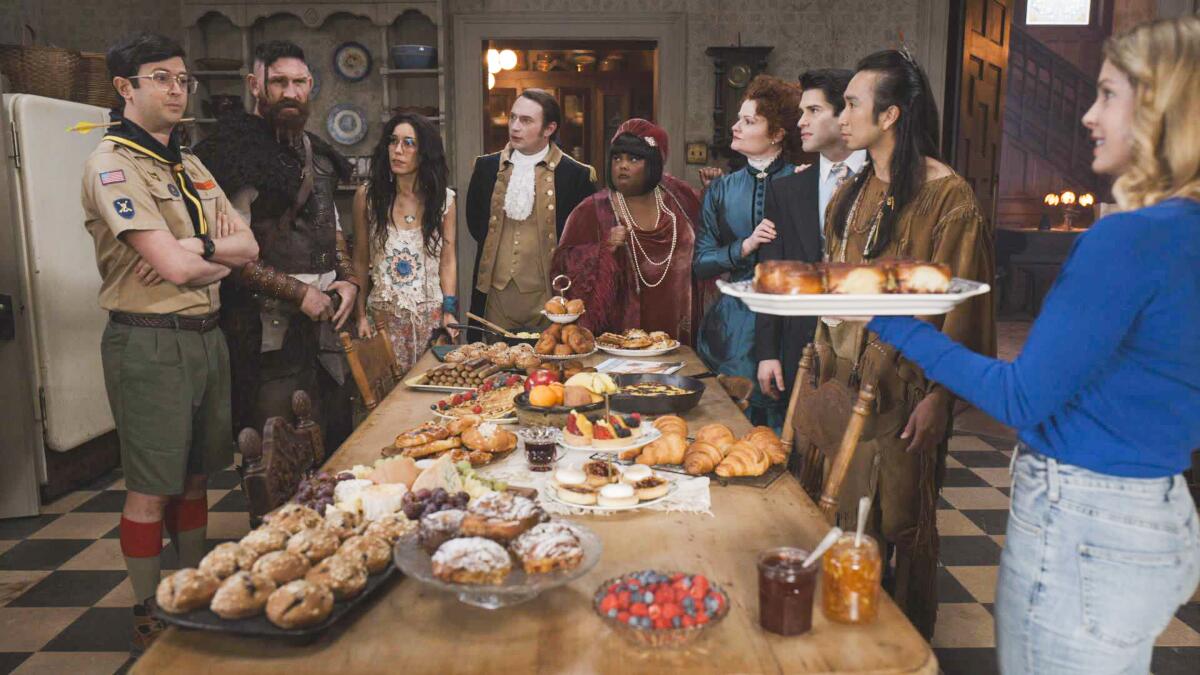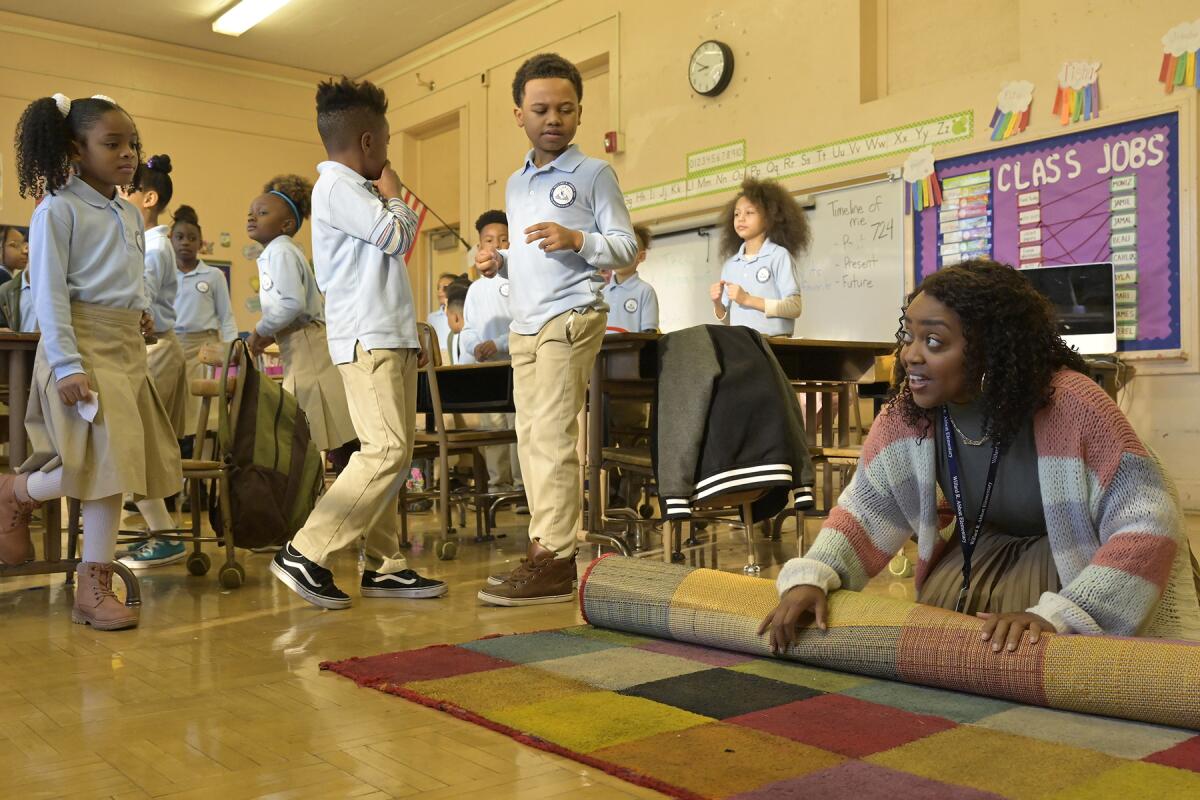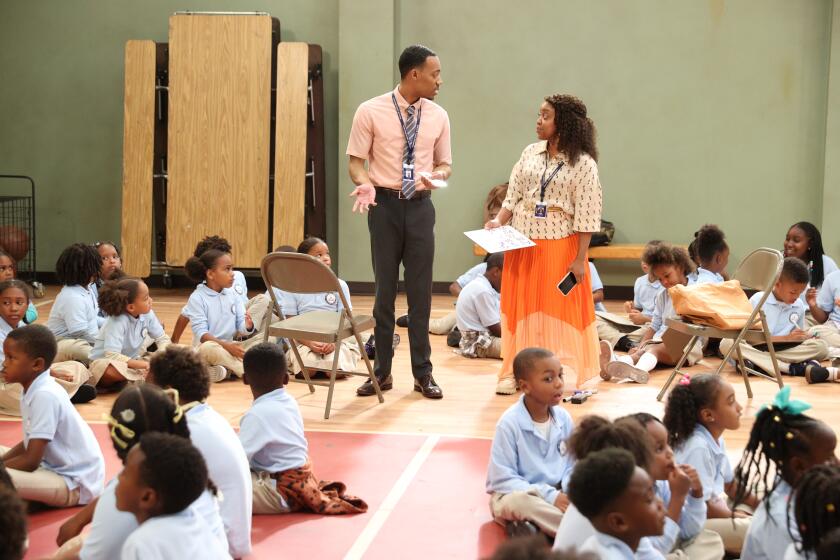In a polarized world, TV’s best sitcoms are about solving problems — together

- Share via
In the CBS sitcom “Ghosts,” a palpable hit by the usual reckonings and already renewed for a second season, Rose McIver and Utkarsh Ambudkar play Samantha and Jay, a New York couple who inherit an estate upstate on the death of Sam’s aunt. She’s a freelance journalist; he’s a chef without a kitchen. While setting the place in order, Sam falls down a flight of stairs, and when she returns to the house after a three-week coma, discovers she can see the place’s other inhabitants, a motley crew of spirits who have died on the property across the years — some before the house was built, or the United States were united, or even states.
They include, in reverse chronological order of death, Trevor, a Wall Street type, forever pants-less (Asher Grodman); Pete, a scoutmaster (Richie Moriarty) shot by a stray arrow while introducing his troop to archery, the arrow still sticking through his neck like a novelty store gag; Flower (Sheila Carrasco), who tried to make friends with a bear; Alberta (Danielle Pinnock), a Jazz Age singer, the precise cause of whose death is discovered during the first season; Hetty (Rebecca Wisocky), a haughty Gilded Age doyenne, the house’s original inhabitant and Sam’s fourth great-grandmother; Isaac (Brandon Scott Jones), a Revolutionary War officer, dead from dysentery, who after two and a half centuries still does not understand that he’s gay; Sasappis, called Sas (Román Zaragoza), from the Lenape Nation; and Thorfinn (Devan Chandler), a Viking struck by lightning. There are also a number of cholera victims in the basement and a few British redcoats in a shack out back.
The ghosts are disturbed at first by the new owners’ plan to turn the house into a bed and breakfast. They don’t like the thought of strangers crowding up the place and sleeping in their rooms. (They all have rooms, and they do sleep.) They try to haunt the couple out. But soon enough the dead come to accommodate the quick and the quick to appreciate the dead. Jay, who cannot see the ghosts, soon believes that Sam can, and begins to enjoy hearing about them. (“It’s like watching ‘Friends,’ except you can’t see or hear ‘Friends’ and you only have one person to tell you what it’s about.”) Eventually, they will play Dungeons and Dragons together.
This is It Takes a Village comedy, shows built around cooperation and communication and community, and it is historically a dominant strain in network television. It’s the raison d’être — one might even say mission — of another well-performing new series, Quinta Brunson’s delightful “Abbott Elementary,” on ABC, in which a coterie of teachers attempt to make things work — and do — in a predominantly Black Philadelphia elementary school, in spite of budget constraints, their own blind spots and a hilariously self-involved principal. These are people you want to be around, who work together without sacrificing their individuality, not to say eccentricities, and get results.
With “Abbott Elementary,” “Grand Crew,” “Pivoting” and “American Auto,” the network comedy is at the forefront of midseason. Here’s what we recommend.
Whether set in a workplace or a family or among friends, these shows model a world in which characters solve problems together, and — as important — in which problems are, in fact, solvable, a tonic in an absurdly polarized world. Their mood, allowing for occasional moments of Great Seriousness, is sunny, their glass never less than three-quarters full — of lemonade, probably. Critics might call them unrealistic and sentimental, even childish, as if darker comedy more accurately reflected Real Life. But people respond to sentiment; we aspire. Only the most perverse of us hope for anything but a good outcome, on television as in life. And even with the pie for viewers sliced thin, these series routinely outperform Emmy-winning premium cable hits by many millions.
Among the current crop of It Takes a Village comedies, CBS has a clutch of cross-cultural ones, including the practically perfect “The Neighborhood,” with Cedric the Entertainer, Max Greenfield and their families fully woven into one another’s lives; “Bob Hearts Abishola,” which has married its Midwestern and Nigerian leads; and the Afghan refugee sitcom “The United States of Al.” NBC’s recently concluded “Brooklyn Nine-Nine,” co-created by Michael Schur — also of the can-do “Parks and Recreation” and literally hell-beating “The Good Place” — has much less to do with police work than personal relations; the heart of its “Grand Crew” is five friends of various temperaments (and their bartender) sharing advice to move one another forward. ABC has the It Takes a Family series “The Conners,” “The Goldbergs,” “black-ish” and “Home Economics,” Fox the eccentrics-in-a-cat-cafe comedy “Call Me Kat.” (These sorts of programs are not restricted to broadcast television, of course. Apple’s “Ted Lasso” and Disney+’s “Big Shot” are shows literally about teamwork. But they are the exception, not the rule.)

Back when TV themes were songs, the credo was put down in words: “Thank you for being a friend.” “I’ll be there for you.” “Love is all around.” “You want to go where everybody knows your name.” “Come and knock on our door.” “Good times, anytime you need a friend.” ”When you’re lost out there and you’re all alone, a light is waiting to carry you home.” “Hold on tight, we’ll muddle through one day at a time.”
The pact between series and viewers was never more plainly expressed than over the closing credits of “The Beverly Hillbillies”:
Well now it’s time to say goodbye to Jed and all his kin
They would like to thank you folks for kindly dropping in
You’re all invited back again to this locality
To have a heaping helping of their hospitality
Broadcast sitcoms aim to create a space that draws you to return happily week after week, usually to be told a fresh story that will reach a conclusion in half an hour. Some episodes might contribute to longer arcs — arcs are everywhere these days, notably driving the sorts of comedies you’ll find on cable or streaming — but these are shows you can drop in and out of without missing anything substantial. They’re environmental. You may miss a reference here or there, a new boyfriend, a new hire, but you always know where you are, and you are there for the hang as much as the action. Real life is much the same from day to day, after all, and it’s that continuity that makes these shows feel so familiar and welcoming. They follow the calendar: There will be holiday episodes, in which arguments end inevitably in agreement — or something close enough for comedy.
Such series season well too. Because they are not out to push envelopes or create new forms, but only play with relationships over time, they don’t have to turn formal somersaults to stay fresh. They create a kind of depth that doesn’t always seem profound, either because of the joke-a-minute context or, conversely, because serious or sentimental points are made so explicitly — subtext as text. And yet loyal viewers, who become family by extension, recognize their richness. “Relatable” is just another word for human.
The long seasons of network television give actors plenty of time to know their characters, writers plenty of time to know the actors, characters plenty of time to know each other, viewers plenty of time to know the characters, and any other combination of those terms you might care to arrange. We’re past the age where six seasons of “Good Times” could produce 133 episodes, let alone the 180 “I Love Lucy” issued over six years. (There are 275 — 275! — episodes of “Cheers” running around out there.) Yet as of this writing, 74 episodes of “The Neighborhood” have aired, and the show has been renewed for a fifth season. Familiarity breeds contentment.
Of course there will be conflict, even irascible central characters, because that’s where the comedy comes in, but, more important, there will be resolutions. (And possibly cheesecake.) Thorfinn’s bones will not be sold for a profit but given a Viking funeral. The ghosts will help Sam and Jay get their bed and breakfast going, even against what they regard as their better interests. On “Abbott Elementary,” Gregory (Tyler James Williams), the reluctant substitute teacher, will secretly tend the school garden that veteran Barbara (Sheryl Lee Ralph) and relative newcomer Jacob (Chris Perfetti) unusually collaborate to start; and even problematic principal Ava (Janelle James) will have something to teach the overconfident Janine (Brunson) when it comes to step dance. All over prime time, apologies will be made, forgiveness given, new understandings understood, equilibrium lost and restored, week after week, and a message sent.
Y’all come back now, y’hear?
‘Abbott Elementary’
Where: ABC
When: 9 p.m. Tuesday
Rating: TV-PG-L (may be unsuitable for young children with an advisory for coarse language)
‘Ghosts’
Where: CBS
When: 9 p.m. Thursday
Rating: TV-PG-D (may be unsuitable for young children with an advisory for suggestive dialogue)
More to Read
The complete guide to home viewing
Get Screen Gab for everything about the TV shows and streaming movies everyone’s talking about.
You may occasionally receive promotional content from the Los Angeles Times.








